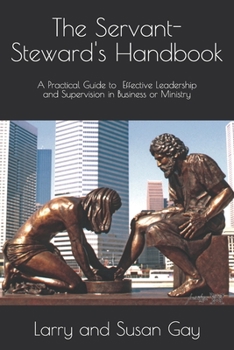The Servant-Steward's Handbook: A Practical Guide to Effective Leadership and Supervision in Business or Ministry
The term "servant-steward" describes effective leaders who:
follow the wise counsel in 1 Kings 12:7: If today you will be a servant to these people and serve them...they will always be your servants; and recognize that the individuals they lead are not "their" people, but people for whom they have been given a stewardship responsibility.
Whether you are a team leader, shift manager, sales executive, school principal, pastor, CEO of a Fortune 500 company or leader of volunteers, you have a servant-stewardship responsibility for the people you lead. Your job as a leader is to steward the skills, gifts and interests of each person under your supervision, helping them to be effective in their work and contribute to something that aligns with their sense of purpose in life.
This handy desktop reference offers practical tips for dealing with the issues veteran or novice leaders face in any organization, including: selecting good people, evaluating their work, dealing with difficult people, handling criticism, leading multi-generational teams, building unity, managing conflict, supervising cross-cultural teams, building cohesive teams separated by long distances, administering effective corrective action (not just punishment), leading great team meetings, building trust in the organization, using a coaching approach to supervision, and more.
The Servant-Steward's Handbook shows how the character and characteristics of servant-stewards, described by the Apostle Paul in his letters to Timothy and Titus, are still relevant today for training effective leaders in any business, industry or ministry in any culture.
The most effective leaders and supervisors are servant-stewards who:see their role as more than a job-it is a calling.are persons of integrity, a model for others in their teaching and their practice. continually seek to grow in their own faith and self-awareness of their strengths and liabilities. have an observably close walk with the Lord. define and apply any authority or administer corrective action consistent with a strong biblical foundation. show genuine concern for the people they lead and provide appropriate help for them to flourish. know how to deal appropriately with conflicts. know they cannot do the job by themselves. build trust by showing their trustworthiness. stand up for what is right, even when they stand alone. recognize, respect and submit to the authority of others over them. focus on positive goals. prepare for succession, gathering the right people to join them in the task. encourage others to work from their strengths with confidence. give honor and recognition for the good work of those they lead. build a culture of people who are not obsessed by the law or policies, but who see the practicality of principles which underlie the law. These are some of the key characteristics drawn from the Letters of Paul to Timothy and Titus.
Part Two of the Handbook includes notes from a group exegesis that serves as a commentary on the three letters. If you are new to the role of supervisor, study the context on which these values and principles are built, take personal ownership of what the Handbook is saying and learn to be an effective servant-steward of the people you have been given to lead.





